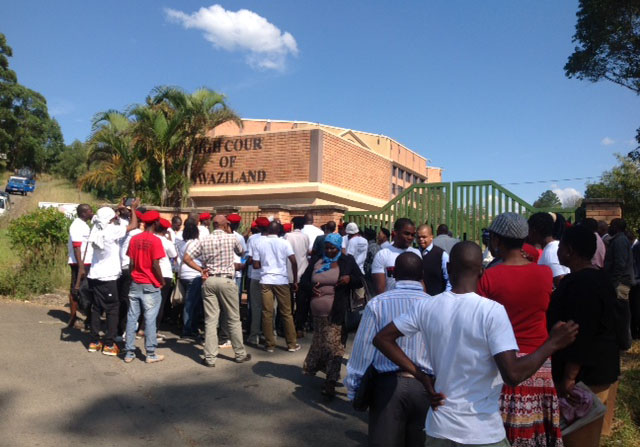On Tuesday 22 April 2014 Judge Mpendulo Simelane began hearing evidence in the High Court in Swaziland in the trial of human rights lawyer Thulani Maseko and journalist Bheki Makhubu for contempt of court.
The ICJ continues to monitor these proceedings given its concerns that the charges are inconsistent with respect for the right to freedom of expression and its concerns about the fairness of the proceedings themselves.
Before the first witness was called, the defence made a series of applications and sought directions from the Court. Among these:
1. The defence claimed that since Judge Mumsy Dhlamini had already ruled that the arrest of Thulani Maseko and Bheki Makhubu had been wrongful and unlawful,, the indictment of the men for contempt of court was not valid.. Judge Mpendulo Simelane, however dismissed this claim, ruling that there was a fresh indictment and the case can proceed to trial.
2. The defence sought directions on the type of procedure to be used in this case, since the Director of Public Prosecutions had challenged the use of procedure stipulated in the Criminal Procedure and Evidence Act and the Supreme Court had yet to make its ruling on this issue in the pending appeal. . Judge Mpendulo ruled that the court remained free to use any procedure it deemed suitable for the contempt proceedings, and that he was using the procedure set out in the Criminal Procedure and Evidence Act, notwithstanding the pending appeal..
3. The defence also sought directions on how to proceed since the presiding trial judge, Mpendulo Simelane, who had previously refused to recuse himself, had been subpoenaed by the defence and was being called as a witness in the matter along with the Chief Justice. Judge Simelane stated that he had not been made aware of the subpoena or the fact that he was being called as a witness, and ordered that the matter proceed to trial all the same.
The State then proceeded to call two witnesses, one from the companies’ registry and the Deputy Registrar of the Supreme Court.
During the day’s proceedings, Judge Simelane ejected two people from the court room.
The first person to be ordered to leave the court was a member of the public whose mobile telephone rang.
The judge bellowed instructions to the police, “get that gadget, eject that person from my court…This court cannot be controlled by the public”.
The judge’s reaction to the interruption generated a lot of mumbling amongst other members of the public in the court.
Thereafter an orderly escorted one of two representatives of the European Union from the court after the Judge, speaking loudly said: “those two gentlemen behind Advocate Maziya, this court is not a bedroom. Get out of my court!”
This too resulted in extensive rumbling from the gallery.
The trial will continue, with the cross examination of the Deputy Registrar of the Supreme Court on 23 April 2014.
Background
The accused were arrested on 17th March 2014 after Chief Justice Ramodibedi had issued a warrant for their arrest on charges of criminal contempt of court.
The charges arise from articles allegedly written by Thulani Maseko and Bheki Makhubu in February and March 2014, in which they questioned circumstances surrounding the arrest of government vehicle inspector, Vincent Gwebu.
The vehicle inspector had been arrested and charged with contempt of court after he had arrested the driver of a High Court Judge.
The articles also raised questions about the integrity, impartiality and independence of the Swaziland judiciary in relation to the Gwebu case.
The legality of the arrest, detention and charges against Thulani Maseko and Bheki Makhubu was successfully challenged before High Court Judge Mumcy Dhlamini, resulting in their release from custody for two days..
However, the men were rearrested and detained when the State appealed Judge Mumcy Dhlamini’s ruling.
The ICJ continues to call on the authorities in Swaziland to ensure that the charges and proceedings against Thulani Maseko and Bheki Makhubu are fully consistent with Swaziland’s obligations to respect the rights to freedom of expression and to a fair trial before an independent and impartial court, as enshrined under the International Covenant on Civil and Political Rights, the African Charter on Human and Peoples’ Rights and elaborated under the Principles and Guidelines on the Right to a Fair Trial and Legal Assistance in Africa.
Wilder Tayler, the Secretary General of the ICJ noted that “this case touches on important aspects relating to the rights to freedom of expression and to fair trial by an independent and impartial court, the right to trial before an independent and impartial court is a sine qua non of fairness.”
The Principles and Guidelines on the Right to a Fair Trial and Legal Assistance in Africa clarify that ‘Any party to proceedings before a judicial body shall be entitled to challenge its impartiality on the basis of ascertainable facts that the fairness of the judge or judicial body appears to be in doubt.”
Contact:
Arnold Tsunga, or Martin Okumu-Masiga, on +27 11 024 8268 or +27 73 131 8411 or +27 78 234 9125.
There were some demonstrations to support Thulani Maseko and Bheki Makhubu, as the video clip below shows.





